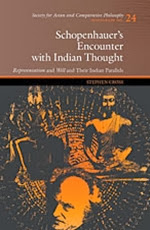Cross: Schopenhauer's Encounter with Indian Thought
Cross, Stephen:
Schopenhauer's Encounter with Indian Thought : Representation and Will and their Indian Parallels / Stephen Cross. - Honolulu: University of Hawaiʻi Press, 2013. - xiv, 287 S. - (Society for Asian and Comparative Philosophy Monographs ; 24)
Hochschulschrift. Teilw. zugl.: Sydney, Univ., Diss., 2003 unter dem Titel: Schopenhauer and Indian thought : an examination of Schopenhauer's teaching in the historical context of the 'Oriental Renaissance' of the early nineteenth century, and in comparison with certains ideas of Mahāyāna Buddhist schools and of Advaita Vedānta
ISBN 978-0-8248-3735-8
US$ 50,00
DDC: 193
Beschreibung
Schopenhauer is widely recognized as the Western philosopher who has shown the greatest openness to Indian thought and whose own ideas approach most closely to it. This book examines his encounter with important schools of Hindu and Buddhist philosophy and subjects the principal apparent affinities to a careful analysis. Initial chapters describe Schopenhauer’s encounter with Indian thought in the context of the intellectual climate of early nineteenth-century Europe. For the first time, Indian texts and ideas were becoming available and the belief that they could bring about a second Renaissance—an “Oriental Renaissance”—was widespread. Schopenhauer shared in this enthusiasm and for the rest of his life assiduously kept abreast of the new knowledge of India.
Principal sections of the book consider the two main pillars of Schopenhauer’s system in relation to broadly comparable ideas found, in the case of Hindu thought, in Advaita Vedānta, and within Buddhism in the Mādhyamika and Yogācāra schools. Schopenhauer’s doctrine of the world as representation, or a flow of impressions appearing in the consciousness of living beings, is first considered. The convergence between this teaching and Indian idealism, especially the doctrine of illusory appearance (māyā), has long been recognized. Schopenhauer himself was aware of it, emphasizing that it was the result not of influence but of a remarkable convergence between Eastern and Western thought. This convergence is subjected to a much more detailed examination than has previously been carried out, undertaken in the light of twentieth-century Indology and recent studies of Schopenhauer.
The second main pillar of Schopenhauer’s system, the doctrine of the world as will, is then examined and its relationship to Indian thought explored. This section of the work breaks new ground in the study of Schopenhauer, for although the similarity of his ethical and soteriological teaching to that of Indian religions (particularly Buddhism) has long been noted the underlying reasons for this have not been grasped. It is demonstrated that they are to be found in hitherto unrecognized affinities, of which Schopenhauer himself was largely unaware, between the metaphysics of the will and Indian ideas relating to karmic impressions (vāsanās), the store-consciousness, the causal body, and śakti as the “force” or “energy” that maintains the existence of the world.
Final chapters discuss the controversial and difficult question of the relation of the will to final reality in Schopenhauer’s thought in the light of Indian conceptions, and suggest that the two central pillars of his philosophy may be seen, to a greater extent than previously supposed, as a bridge by which the Eastern and Western traditions of philosophical thought may be brought into a closer and more creative relationship. [Verlagsinformation]
Inhalt
Preface and Acknowledgments. xiii
List of Abbreviations. xv
1. Introduction. 1
2. Schopenhauer in Context: The "Oriental Renaissance". 9
3. Schopenhauer's Indian Sources: Hinduism. 20
4. Schopenhauer's Indian Sources: Buddhism. 37
5. "Representation": Schopenhauer and the Reality-Status of the World. 49
6. The Reality-Status of the Empirical World: The Mādhyamika Teaching. 66
7. Advaita Vedānta: The World as Illusory Appearance. 78
8. Conclusions: Schopenhauer's Representation and Its Indian Affinities. 90
9. Schopenhauer's Conception of the World as Will. 103
10. Schopenhauer: The Will in Its General Forms (Ideas). 120
11. Metaphysical Factors behind the Empirical World: Advaita Vedānta. 131
12. The Arising of the Empirical World in Buddhism: The Yogācāra Teaching. 148
13. Conclusions: Schopenhauer's Will and Comparable Indian Ideas. 165
14. The Ontological Status of Will. 181
15. Beyond the Will: "Better Consciousness" and the "Pure Subject of Knowing". 193
16. The Hidden Compass: Schopenhauer and the Limits of Philosophy. 207
17. Schopenhauer and Indian Thought. 217
Notes. 231
Bibliography. 265
Index. 275
Autor
STEPHEN CROSS is a fellow of the Royal Asiatic Society and the Temenos Academy (London), and serves on the Academic Board of the latter.
Quellen: University of Hawai'i Press; WorldCat; Library of Congress; Bookbutler; Amazon
Bildquelle: University of Hawai'i Press
Bibliographie: [1]
References
- (2013). Schopenhauer's Encounter with Indian Thought: Representation and Will and their Indian Parallels. Society for Asian and Comparative Philosophy Monographs; 24. xiv, 287 S.
Ähnlich
- Understanding Schopenhauer through the Prism of Indian Culture
- Panaioti: Nietzsche and Buddhist Philosophy
- Schopenhauers Kompass
- Schopenhauer et la pensée indienne
- Schopenhauer's Philosophy of Religion
- Harimoto: God, Reason, and Yoga
- White: The Yoga Sutra of Patanjali
- Free Will, Agency, and Selfhood in Indian Philosophy
- Moksopaya ... Teil 4
- Der Weg zur Befreiung ... Buch 4

